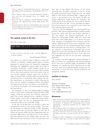 6 citations,
April 2010 in “Journal of Dermatological Science”
6 citations,
April 2010 in “Journal of Dermatological Science” Laminin-511 may help promote hair growth, while laminin-332 does not affect hair loss.
 10 citations,
June 2005 in “The journal of investigative dermatology/Journal of investigative dermatology”
10 citations,
June 2005 in “The journal of investigative dermatology/Journal of investigative dermatology” FP-1 is a key protein in rat hair growth, active only during the growth phase.
 6 citations,
April 2013 in “International Journal of Dermatology”
6 citations,
April 2013 in “International Journal of Dermatology” Valproic acid helped hair growth in alopecia patient; more research needed.
July 1971 in “The journal of nutrition/The Journal of nutrition” Higher quality and quantity of protein lead to better body and hair growth in rats.
 16 citations,
March 2019 in “Experimental dermatology”
16 citations,
March 2019 in “Experimental dermatology” Injury changes how hair follicle stem cells behave, depending on the hair growth stage.
10 citations,
July 1994 in “Journal of Dermatological Science” Cyclosporin extends hair growth in mice, but high-dose corticosteroids block this effect.
 23 citations,
September 2017 in “The journal of investigative dermatology/Journal of investigative dermatology”
23 citations,
September 2017 in “The journal of investigative dermatology/Journal of investigative dermatology” NF-κB is crucial for different stages and types of hair growth in mice.

Trichosol™ with Minoxidil can boost hair growth by 20%.
 6 citations,
January 2021 in “Annals of Dermatology”
6 citations,
January 2021 in “Annals of Dermatology” 650 nm red light helps hair grow and prevents hair loss by affecting certain genes and biological processes.
 28 citations,
March 2016 in “Toxicologic pathology”
28 citations,
March 2016 in “Toxicologic pathology” Dogs could be good models for studying human hair growth and hair loss.
 January 2023 in “Indian dermatology online journal”
January 2023 in “Indian dermatology online journal” A child with ectodermal dysplasia-syndactyly syndrome has a new mutation in the NECTIN4 gene.
 5 citations,
January 2023 in “International Journal of Molecular Sciences”
5 citations,
January 2023 in “International Journal of Molecular Sciences” Hair follicles could be used to noninvasively monitor our body's internal clock and help identify risks for related diseases.

The paper concludes that the patchiness of alopecia areata is likely due to when the immune attack happens in the hair growth cycle.
 13 citations,
June 2020 in “BMC genomics”
13 citations,
June 2020 in “BMC genomics” A specific microRNA, chi-miR-30b-5p, slows down the growth of hair-related cells by affecting the CaMKIIδ gene in cashmere goats.
 3 citations,
June 2017 in “International Journal of Radiation Biology”
3 citations,
June 2017 in “International Journal of Radiation Biology” Gamma rays did not change hair follicle density but increased white and hypopigmented hairs in mice.
 185 citations,
December 2011 in “Molecular and cellular endocrinology”
185 citations,
December 2011 in “Molecular and cellular endocrinology” Skin cells produce and activate vitamin D, which regulates skin functions and supports hair growth.
 12 citations,
November 2014 in “PLOS Computational Biology”
12 citations,
November 2014 in “PLOS Computational Biology” The study concluded that hair growth in mice is regulated by a stable interaction between skin cell types, and disrupting this can cause hair loss.
63 citations,
April 2005 in “Mechanisms of development” Mice with too much Claudin-6 have skin barrier problems and abnormal hair growth.
 November 2022 in “Journal of Drug Delivery and Therapeutics”
November 2022 in “Journal of Drug Delivery and Therapeutics” Unani medicine links diffuse hair loss to poor skin pore function and body dryness, leading to thinning hair.
 April 2016 in “British Journal of Dermatology”
April 2016 in “British Journal of Dermatology” Eyelashes are important for looks and eye protection, and more people are treating sparse eyelashes; more research is needed to understand eyelash biology and improve treatments.
 77 citations,
March 2014 in “Cold Spring Harbor Perspectives in Medicine”
77 citations,
March 2014 in “Cold Spring Harbor Perspectives in Medicine” Fat cells are important for healthy skin, hair growth, and healing, and changes in these cells can affect skin conditions and aging.
 April 2016 in “Plastic and reconstructive surgery. Global open”
April 2016 in “Plastic and reconstructive surgery. Global open” Tafluprost could be a potential treatment for hair loss by promoting hair growth phase changes.
 5 citations,
June 2017 in “in Vivo”
5 citations,
June 2017 in “in Vivo” Vitamin C deficiency changes gene expression, affecting skin and hair health.
11 citations,
August 2021 in “The journal of investigative dermatology/Journal of investigative dermatology” A gene mutation causes early keratinocyte maturation leading to hair loss in Olmsted syndrome.
64 citations,
October 1998 in “Acta dermato-venereologica” Grape seed proanthocyanidins can promote hair growth.
 January 2013 in “Juntendo Medical Journal”
January 2013 in “Juntendo Medical Journal” Understanding the normal hair cycle and different types of hair loss is important for maintaining healthy hair.
 October 2012 in “Humana Press eBooks”
October 2012 in “Humana Press eBooks” Grape seed extract is good for skin care, with antioxidant, anti-inflammatory, and anti-cancer effects.
9 citations,
September 2013 in “Journal of histochemistry and cytochemistry/The journal of histochemistry and cytochemistry” Matriptase is highly active in hair follicles and sebaceous glands, especially during hair growth phases.
24 citations,
April 2006 in “Journal of the American Academy of Dermatology” Heat shock protein 27 is more present in the active growth phase of human scalp hair follicles.
 2 citations,
November 2019 in “Cancer reports”
2 citations,
November 2019 in “Cancer reports” The Wnt signaling pathway is not a major factor in the development of keratoacanthoma, a type of skin tumor.























